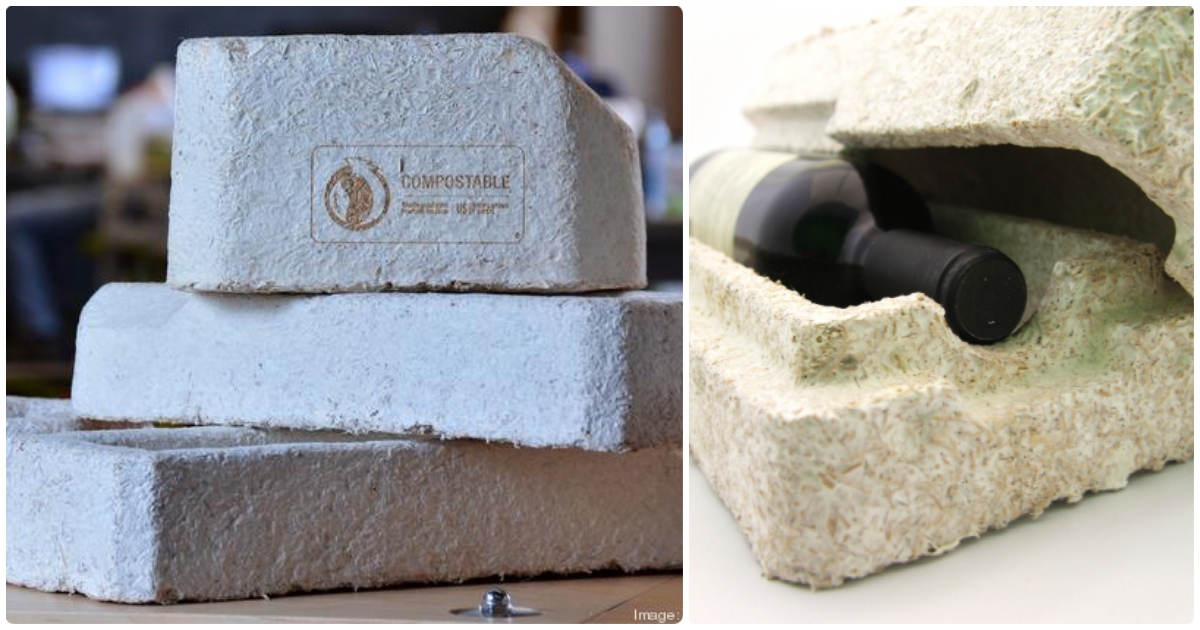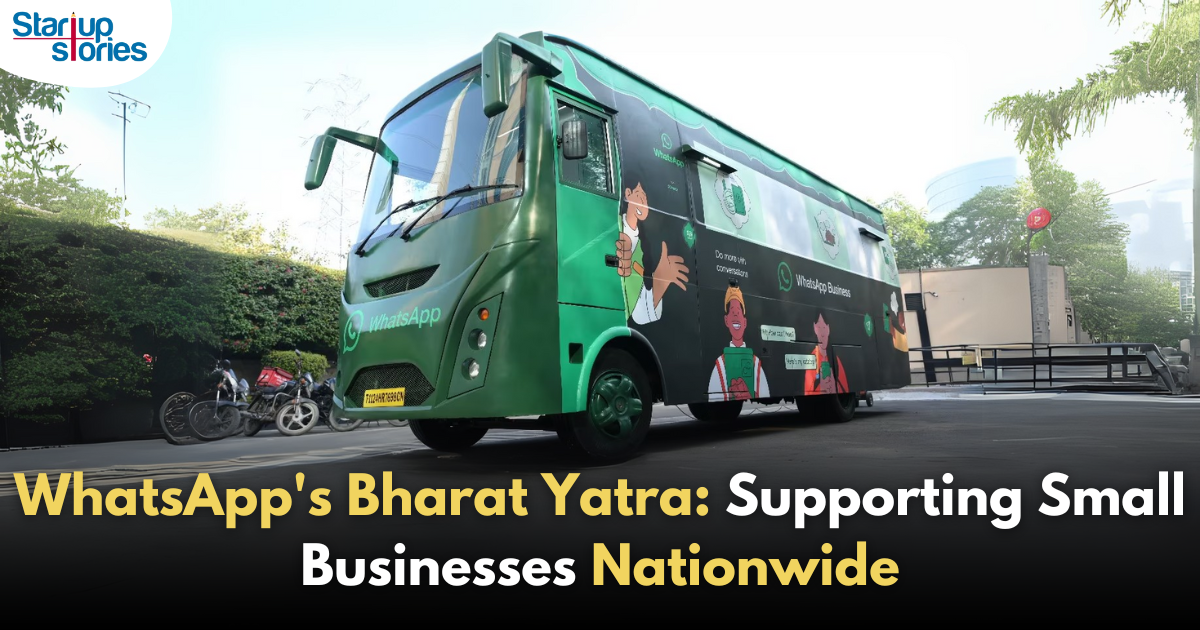Emerging Startup Stories
Ecovative Design – A Startup Providing Sustainable Alternatives To Plastic

The world is becoming energy conscious and is constantly looking for ways to reduce carbon emissions and carbon footprints and shift to sustainable and renewable energy practices. Plastic is a bane to the environment, owing to its ability to adversely affect ecosystems and inability to decompose once it reaches a landfill or the environment. Single use plastics are a major contributor to this problem. A company called Ecovative Design is slowly trying to develop an alternative to plastics by making packaging material and various other products from mushrooms, which are a type of fungus. Ecovative Design was founded by Eben Bayer and Gavin McIntyre and is based out of Green Island, New York.
The beginning
Eben Bayer and Gavin McIntyre worked on their idea as a part of their university project during an Inventor’s Studio course at Rensselaer Polytechnic Institute. They initially developed and created an insulation material using this mycelium technology and named it Greensulate. They followed this up by founding Ecovative Design. After winning $ 700,000 at an event called the Picnic Green Challenge, they went commercial by making a protective packaging called EcoCradle.
Raw materials
The founders claim they were inspired by observing how the fungal mycelium strongly bonded with wood chips. They realised they could use this resinous property to create a product which essentially left zero carbon footprint and is totally safe since it is organic. They chose a special strain of fungus which they left at a place for about five days, where the fungal mycelium bonded with non food agricultural materials and created organic compostable material. They finally heated the product to make the fungus inert. This material was then placed in moulds so it could be shaped into the requirements of the product. The founders developed products which can be used in insulation, protective packaging and structural biocomposites.
It is the aim of the founders that once the use of mycelium grown products gain household acceptance, they can replace the use of plastic and polystyrene. This technology is being studied by other companies who rely on mycelium technology and can incorporate it into their product design. Ecovative Design has a revenue model wherein they license their technology and offer it to interested vendors. Companies like Ikea and Dell use their protective packaging when they ship their products.
With Ecovative Design currently researching and creating products which cater to the apparel, food, textile and skincare industries, it will be interesting to see how these products replace non biodegradable products in the future.
Emerging Startup Stories
WhatsApp’s Bharat Yatra: Empowering Small Businesses Across India!

WhatsApp has embarked on a nationwide initiative called Bharat Yatra to empower small and medium businesses (SMBs) across India. This innovative mobile bus tour aims to provide hands-on training and support to help businesses leverage the power of digital technology, particularly through the WhatsApp Business app.
Key Focus Areas
- Digital Skill Enhancement: The Bharat Yatra program is designed to equip SMBs with essential digital skills necessary to thrive in the digital age. This includes training on how to effectively navigate the digital landscape and utilize online tools for business growth.
- WhatsApp Business App Training: Participants will learn how to use the WhatsApp Business app to connect with customers, share product catalogs, and manage inquiries efficiently. This training is crucial for businesses looking to enhance customer engagement and streamline communication.
- Latest Features and Updates: The tour will highlight the latest features of WhatsApp Business, including Meta Verified, which enhances business credibility, and custom messaging options that allow for personalized communication with customers.
- AI Integration: Businesses will also be introduced to the potential of Meta AI integration, which can streamline customer engagement processes and boost overall productivity. This aspect of the training aims to familiarize SMBs with advanced tools that can enhance their operational efficiency.
Tour Details
The Bharat Yatra will kick off its journey in Delhi-NCR, visiting bustling markets such as Laxmi Nagar, Rajouri Garden, and Nehru Place. Over the coming months, the bus will cover key business hubs in cities like Gurugram, Noida, Agra, Lucknow, Indore, Ahmedabad, and others. Each stop will feature interactive demos, expert guidance, and personalized support tailored to the unique needs of local businesses.
Impact on the Indian Economy
By engaging directly with businesses across major cities, WhatsApp aims to create a tangible impact on the Indian economy. The initiative aligns with WhatsApp’s broader goal of supporting small businesses and fostering digital growth in India. According to Ravi Garg, Director of Business Messaging at Meta India, “Small businesses are the backbone of India’s economy, and with the right digital tools, they have the power to supercharge the country’s digital transformation.”
Conclusion
As the Bharat Yatra continues its journey across India, it is expected to empower thousands of SMBs, contributing significantly to India’s economic development and digital transformation. By providing essential training and resources, WhatsApp is not only enhancing business capabilities but also reinforcing its commitment to fostering a robust small business ecosystem in India. This initiative builds on previous efforts such as WhatsApp Se Vyapaar, which aimed to upskill millions of traders, further demonstrating WhatsApp’s dedication to supporting India’s entrepreneurial landscape.
Emerging Startup Stories
Discover Kheyti, The Startup Changing The Lives of Farmers In India

Farming has been an integral part of India’s history and culture for ages. It’s been the foundation of the Indian economy, supporting millions of people with food and jobs. Crops and agriculture hold immense importance in Indian society, not just in terms of money, but also in terms of culture, community, and spirituality.
Farming is a way of life for many people in India, but it can be a difficult and unpredictable business and farmers face a number of challenges, from erratic weather patterns to low market prices for their crops. Kheyti is a social enterprise founded in 2015 by Saumya, Kaushik Kappagantula, and Sathya Raghu. The organisation provides sustainable solutions to small farmers in India, helping them overcome challenges and improve their lives.
Kheyti’s flagship product is the “Greenhouse-in-a-Box,” a low-cost modular greenhouse that allows farmers to grow high-value crops year-round, even in unfavourable weather conditions. operates on a subscription-based model, where farmers can purchase a “Greenhouse-in-a-Box” kit or sign up for crop advisory services on a monthly or annual basis. Kheyti.com also earns revenue by connecting farmers with markets and buyers, taking a small commission on sales. They work to keep the costs low by partnering with local manufacturers to produce their products and leveraging tech to provide personalised crop advisory services at scale.
They also provide crop advisory services to farmers, offering personalised advice on crop selection, planting, and management. In total, The company has helped over 6,000 small farmers increase their incomes by an average of 300%. You call them small farmers, Kheyti calls them Smart farmers!
While there are other companies in India that offer similar solutions to small farmers, Kheyti stands out for its focus on sustainability, innovation, and community involvement. It works closely with farmers to develop tailored solutions that meet their needs while focusing on sustainable farming practices. Through its efforts, Kheyti has improved soil health, reduced water usage, and increased yields of various crops.
Looking ahead, Kheyti plans to expand its reach to more farmers in India and beyond and aims to continue developing new products and services that can help small farmers overcome the challenges they face. With its commitment to sustainability and innovation, The visionaries at Kheyti claim it has the potential to transform the agricultural sector and contribute to a more equitable future for all.
Imagine the joy and hope Kheyti brings to struggling farmers in India. With Kheyti’s help, over 6,000 small farmers have transformed their lives, becoming Smart farmers who handle challenges and succeed. With sustainable solutions, Kheyti is not only revolutionising agriculture but also spreading hope for a brighter future.
Emerging Startup Stories
Suki: This Startup Wants To Transform Healthcare With Its Artificial Intelligence Tool

We live in a rapidly transforming era where humanity is making exponential leaps in technology. Thirty years ago, no one would have believed you could talk to an online voice assistant to create tasks and get things done. Ten years ago, no one would have believed humanity would land robots on Mars. Technology truly has improved the quality of living of every human who owns a smartphone and has access to an internet connection. Voice assistants are slowly replacing manual tasks and making lives easier and efficient. Siri, Alexa, Google Voice Assistant are just some of the widely used artificial intelligence based tools which are employed on a daily basis. Artificial intelligence, which is hailed as the technology of the future is now slowly making its way into much more complex domains like self driving vehicles, quantum computing and also health care.
Suki, a United States of America based startup founded by Punit Soni, developed their own voice assistant which runs on artificial intelligence to simplify healthcare for doctors and other healthcare professionals. In simple terms, Suki is akin to Siri for doctors. While you could order a pizza or schedule an appointment on Siri, doctors could modify, edit and add health records of their patients. Suki is a powerful tool to help doctors with documentation of health records which often take hours of their (doctors) time.
Suki currently focuses on documentation but has the potential to expand its usage to data queries, ordering, prescribing and billing. According to a white paper published by Suki, using its technology increases the time a doctor spends with a patient by 12% by cutting note taking time by 76%. The time which is saved also brings in a financial benefit of $30,000 more in revenue a year on average for doctors.
Suki raised a $ 20 million Series B round from Flare Capital Partners, First Round Capital, and Venrock, doubling its total funding to $ 40 million since its 2017 launch. Suki is also looking to expand its reach in India and has decided to establish Bangalore as their base of operations. India holds a lot of potential for Suki considering the amount of manual work which goes into almost any sector.
It would be interesting to watch how Suki and other similar AI based startups would transform healthcare across the world.













jusia
June 7, 2025 at 1:57 pm
average cost of clomid clomiphene price in usa can i purchase generic clomid without rx clomiphene for sale how can i get clomiphene cost of clomid for men where can i get clomiphene price
Kuwin
November 5, 2025 at 1:15 pm
kuwin sở hữu kho game đa dạng từ slot đến trò chơi bài đổi thưởng, mang đến cho bạn những giây phút giải trí tuyệt vời.
GO88
November 6, 2025 at 1:22 pm
Tham gia cộng đồng game thủ tại Go88 để trải nghiệm các trò chơi bài, poker phổ biến nhất hiện nay.
站群程序
November 10, 2025 at 5:22 am
搭载智能站群程序,自动化搭建与管理,为SEO项目提供核心驱动力。站群程序
站群程序
November 12, 2025 at 6:25 am
搭载智能站群程序,自动化搭建与管理,为SEO项目提供核心驱动力。站群程序
iwin
November 12, 2025 at 1:50 pm
iwin – nền tảng game bài đổi thưởng uy tín, nơi bạn có thể thử vận may và tận hưởng nhiều tựa game hấp
MM88
November 16, 2025 at 4:58 pm
Khám phá thế giới giải trí trực tuyến đỉnh cao tại MM88, nơi mang đến những trải nghiệm cá cược thể thao và casino sống động.
J88
November 28, 2025 at 10:05 pm
Đến với J88, bạn sẽ được trải nghiệm dịch vụ cá cược chuyên nghiệp cùng hàng ngàn sự kiện khuyến mãi độc quyền.
NetBet Casino Willkommensbonus
December 21, 2025 at 5:38 pm
Experten der Sportwetten gefallen besonders die Top-Quoten der Live
Wetten von bet365 Schweiz. Zusätzlich kannst du den Autoplay-Modus aktivieren oder im Turbo-Modus spielen,
wenn du mehr Tempo willst. Die hohe Kundenzufriedenheit und
die Vielfalt der Sportwetten machen bet365s zum Marktführer.
Bei time2play.com bieten wir personalisierte Casino- und Sportwettenangebote über Affiliate-Links an und verdienen bei einer Einzahlung eine Provision, ohne das für dich zusätzliche Kosten entstehen.
Auch was den Bonus angeht gibt es bei bet365 Schweiz keine Ausnahme.
Aus der Schweiz kann auf das gesamte Angebot von bet365 Schweiz zurückgegriffen werden. Auch die Schweiz wird natürlich von einem so bekannten und international tätigen Buchmacher wie bet365 nicht ausgelassen.
Dabei gilt es den oben genannten Code als aktuellen Gutscheincode
bet365 “JBVIP” für Österreich zu nutzen.
Um dies auch wirklich zu belegen, haben wir Tausende von unterschiedlichen Casinos überprüft,
um herauszufinden, wie die Spielerinnen und Spieler dort behandelt werden,
und haben auch andere wichtige Faktoren berücksichtigt, die das Benutzererlebnis beeinflussen. Sie erhalten aber auch Antworten auf
Ihre Fragen zu diesem Thema und vielerlei Hilfestellungen, vor allem dann, wenn Sie das Gefühl haben, dass die Dinge aus dem Ruder laufen. Darüber
hinaus haben wir in unseren Themenbereichen zur Glücksspielsucht auch noch viele weitere Artikel
für Sie zusammengetragen, die sich alle mit dem
problematischen Glücksspielverhalten und den Schwierigkeiten, die sich daraus ergeben, auseinandersetzen. Das vollständige Bonusangebot jedes einzelnen Casinos in befindet sich in den Casino-Rezensionen. Die verschiedenen Casinoboni sind bei den Spielern und Spielerinnen äußerst beliebt, da diese
ihnen eine gute und vor allem kostenlose Möglichkeit bieten, etwas zu gewinnen oder zumindest
etwas zusätzlich zur getätigten Einzahlung zu erhalten. Die daraus resultierende Bewertung sollte Ihnen eine gute Vorstellung davon geben, wie
wahrscheinlich Sie ein gutes, sicheres und faires Spielerlebnis
im betreffenden Casino haben werden.
References:
https://online-spielhallen.de/malina-casino-deutschland-ihr-guide-durch-das-online-glucksspiel-erlebnis/
Learn Imperial Poker game
December 26, 2025 at 6:39 pm
There are north of 7,000 games by more than 60 providers,
so I guarantee you’ll find a game you like. Okay, enough about
the bonuses, because I’ll need an entire page just about that.
Offer a wealth of resources and support for individuals facing issues
with gambling.
If you are looking for the best online casino Australia
in 2025, you came to the right place. By doing your own research
and experimenting, you are sure to find the best Aus
online casino site for you! Choosing the best
online casino site in Australia can sound daunting.
For top-quality casino brands, we encourage you to see our top Australia online casino list
and read a few of our expert reviews. Modern online casino companies know the market and their customer base well enough to make things as accessible as humanly
possible.
References:
https://blackcoin.co/jokaroom-login-australia-access-your-vip-casino-account/
Australian casino welcome bonus
December 27, 2025 at 8:27 am
With these steps you’ll be spinning the reels or joining live tables at WinSpirit in no time — responsibly and with a clear plan. Always ensure you use official channels and contact support if a site
mirror is required. The Interactive Gambling Act affects operators; however, Australian residents may legally play at licensed offshore sites like WinSpirit where local law permits.
If you reach VIP tiers, higher limits may be available—but
the same rules of bankroll discipline apply. Progressive
pools grow across networks or provider portfolios; fixed jackpots are large one-off prizes
within a single game. Players earn points
based on wagers and wins — the highest scorers share the prize pool.
Isn’t that a fascinating experience to behold? Looking for the camaraderie and thrill only a live-action table
can offer? These glimmering establishments burst with possibilities, each one
a mini-universe of gaming options and opportunities. Located in the heart of Johannesburg, a stark centerpiece among the city’s high rises
and shopping malls, are the casinos. Montecasino – the ever-buzzing, all-in-one entertainment planet in Johannesburg’…
Players should monitor official communication channels for current promotional codes
as these offers frequently update. The VIP structure typically requires substantial regular play to achieve upper-tier status,
with benefits proportional to playing volume.
Higher loyalty tiers provide enhanced rewards including accelerated point earning rates,
higher withdrawal limits, personalized bonuses, and dedicated
account management. WinSpirit Casino operates a tiered loyalty
program rewarding consistent play with progressive benefits.
Most promotions also have time limits that require wagering requirements to be
met within a certain time frame, usually between 7 and 30 days depending on the size of the promotion. These bonuses
have specific terms and conditions that determine their practical value
beyond the stated amounts.
References:
https://blackcoin.co/what-is-the-best-online-casino-and-how-much-have-you-won-before/
blogs.koreaportal.com
December 29, 2025 at 1:14 pm
gamble online with paypal
References:
blogs.koreaportal.com
https://www.jobindustrie.ma/companies/best-paypal-betting-sites-top-sportsbooks-that-accept-paypal
December 29, 2025 at 1:33 pm
casino online paypal
References:
https://www.jobindustrie.ma/companies/best-paypal-betting-sites-top-sportsbooks-that-accept-paypal/